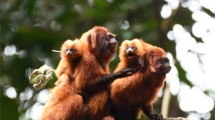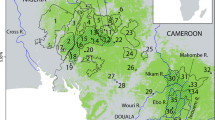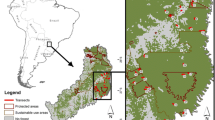Abstract
Understanding the impact of zoonotic diseases on wild primate populations is important for assessing local extinction risks and for evaluating potential mitigating factors. Comparative data on demographic changes in two isolated populations of the northern muriqui (Brachyteles hypoxanthus) during a severe yellow fever outbreak in southeastern Brazil provide unique insights into the potential effects of this disease in this Critically Endangered species. From October 2016 to April 2017, the muriqui population at the Reserva Particular do Patrimônio Natural—Feliciano Miguel Abdala (Caratinga) lost 31 of its 324 members, or nearly 10%, whereas the population at the Reserva Particular do Patrimônio Natural—Mata do Sossego (Sossego) declined from 34 to 25 individuals, or 26%. Greater per-capita risks to muriquis in the Sossego population could be related to ecological and anthropogenic differences, including a wetter climate and an absence of sympatric howler monkeys (Alouatta guariba), which may have directly or indirectly buffered the Caratinga muriquis. Although we lack definitive confirmation that the muriqui population declines were caused by yellow fever, the timing and magnitude of the losses strongly implicate the disease. We highlight the risks of catastrophic population declines in small populations and emphasize the value of long-term demographic monitoring studies.


Similar content being viewed by others
References
Almeida MAB, Santos E, Cruz Cardoso J, Fonseca DF, Noll CA, Silveira VR et al (2012) Yellow fever outbreak affecting Alouatta populations in southern Brazil (Rio Grande do Sul State), 2008–2009. Am J Primatol 74:68–76. https://doi.org/10.1002/ajp.21010
Almeida MAB, Cruz Cardoso J, Santos E, Fonseca DF, Cruz LL, Faraco FJC et al (2014) Surveillance for yellow fever virus in non-human primates in southern Brazil, 2001–2011: a tool for prioritizing human populations for vaccination. PLoS Negl Trop Dis 8(3):e2741. https://doi.org/10.1371/journal.pntd.0002741
Augusto D, Cruz CH (2017) Simonésia tem o primeiro caso de morte com suspeita de febre amarela. http://miradouronoticias.com/web/2017/01/simonesia-tem-o-primeiro-caso-de-morte-com-suspeita-de-febre-amarela/. Accessed 3 Oct 2018
Barros JBG, Vilela DAR, Melo FR (2011) Parâmetros fisiológicos, hematológicos e morfométricos de exemplar de muriqui-do-norte (Brachyteles hypoxanthus) submetido captura e contenção química para fins de translocação em Minas Gerais. In: Melo FR, Mourthé I (eds) A primatologia no Brasil, vol 11. SBPr, Belo Horizonte, pp 175–186
Belo P (2017) Em Caratinga, Secretaria de Saúde confirma 4 mortes por febre amarela. http://g1.globo.com/mg/vales-mg/noticia/2017/01/em-caratinga-secretaria-de-saude-confirma-4-mortes-por-febre-amarela.html. Accessed 20 Nov 2018
Bicca-Marques JC, Freitas DS (2010) The role of monkeys, mosquitoes, and humans in the occurrence of a yellow fever outbreak in a fragmented landscape in south Brazil: protecting howler monkeys is a matter of public health. Trop Conserv Sci 3(1):78–89
Bonaldo MC, Gómez MM, dos Santos AAC, de Abreu FVS, Ferreira-de-Brito A, de Miranda RM et al (2017) Genome analysis of yellow fever virus of the ongoing outbreak in Brazil reveals polymorphisms. Mem Inst Oswaldo Cruz 112(6):447–451. https://doi.org/10.1590/0074-02760170134
Boubli JP, Couto-Santos F, Strier KB (2011) Structure and floristic composition of one of the last forest fragments containing the critically endangered northern muriqui (Brachyteles hypoxanthus, Primates). Ecotropica 17(2):53–69
Bugher JC (1951) The mammalian host in yellow fever. In: Strode GK (ed) yellow fever. Mc-Graw-Hill, New York, pp 299–384
Castro MI (2001) RPPN Feliciano Miguel Abdalla—a protected area for the northern muriqui. Neotrop Primates 9(3):128–129
Chaves PB, Alvarenga CS, Possamai CB, Dias LG, Boubli JP et al (2011) Genetic diversity and population history of a critically endangered primate, the northern muriqui (Brachyteles hypoxanthus). PLoS One 6(6):e20722. https://doi.org/10.1371/journal.pone.0020722
Collias N, Southwick C (1952) A field study of population density and social organization in howling monkeys. Proc Am Philos Soc 96(2):143–156
Faria NR et al (2018) Genomic and epidemiological monitoring of yellow fever virus transmission potential. Science 361:894–899. https://doi.org/10.1126/science.aat7115
Fernandes NCCA, Cunha MS, Guerra JM, Réssio RA, Cirqueira CS, D’Andretta Iglezias S et al (2017) Outbreak of yellow fever among nonhuman primates, Espírito Santo. Braz Emerg Infect Dis 12:2038. https://doi.org/10.3201/eid2312.170685
Figueiredo PO, Silva ATS, Oliveira JS et al (2018) Detection and molecular characterization of yellow fever virus. EcoHealth. https://doi.org/10.1007/s10393-018-1364-z
Goldani LZ (2017) Yellow fever outbreak in Brazil, 2017. Braz J Infect Dis 21(2):123–124
Hamrick PN, Aldighieri S, Machado G, Leonel DG, Vilca LM, Uriona S et al (2017) Geographic patterns and environmental factors associated with human yellow fever presence in the Americas. PLoS Negl Trop Dis 11(9):e0005897. https://doi.org/10.1371/journal.pntd.0005897
Holzmann I, Agostini I, Areta JI, Ferreyra H, Beldomenico P, di Bitetti MS (2010) Impact of yellow fever outbreaks on two howler monkey species (Alouatta guariba clamitans and A. caraya) in Misiones, Argentina. Am J Primatol 72(6):475–480. https://doi.org/10.1002/ajp.20796
Klitting R, Gould E, Paupy C, de Lamballerie X (2018) What does the future hold for yellow fever virus? (I). Genes 9(6):291. https://doi.org/10.3390/genes9060291
Mendes SL (2018) Febre amarela: ameaça à saúde pública e tragédia ambiental. Jornal do Brasil 24 Março 2018. http://www.jb.com.br/artigo/noticias/2018/03/24/febre-amarela-ameaca-a-saude-publica-e-tragedia-ambiental/. Accessed 30 July 2018
Ministério da Saúde (2017) Emergência epidemiológica de febre amarela no Brasil, no período de dezembro de 2016 a julho de 2017. Boletim Epidemiológico—SVS—Ministério Da Saúde 48(28):1–22
Ministério da Saúde (2018) Monitoramento do período sazonal da febre amarela Brasil—2017/2018. Brasília: Ministério da Saúde; 2018. Available from: http://portalarquivos2.saude.gov.br/images/pdf/2018/janeiro/16/informe-febre-amarela-9-16jan18.pdf. Accessed 30 Oct 2018
Monath TP, Vasconcelos PFC (2015) Yellow fever. J Clin Virol 64:160–173. https://doi.org/10.1016/j.jcv.2014.08.030
Moreira-Soto A, Torres MC, de Lima Mendonça MC, Mares-Guia MA, dos Santos Rodrigues CD, Fabri AA et al (2018) Evidence for multiple sylvatic transmission cycles during the 2016–2017 yellow fever virus outbreak, Brazil. Clin Microbiol Infect 24(9):1019. e1011–1019.e1014. https://doi.org/10.1016/j.cmi.2018.01.026
Moreno ES, Spinola R, Tengan CH, Brasil RA, Siciliano MM, Coimbra TLM et al (2013) Epizootias de febre amarela em primatas não humanos no estado de São Paulo, Brasil, 2008–2009. Rev Do Inst de Med Trop de São Paulo 55(1):45–50. https://doi.org/10.1590/S0036-46652013000100008
Moreno ES, Agostini I, Holzmann I, Di Bitetti MS, Oklander LI, Kowalewski MM et al (2015) Yellow fever impact on brown howler monkeys (Alouatta guariba clamitans) in Argentina: a meta-modelling approach based on population viability analysis and epidemiological dynamics. Mem Inst Oswaldo Cruz 110(7):865–876. https://doi.org/10.1590/0074-02760150075
Nery MS (2018) Influência da Translocação de uma Fêmea sobre a Demografia e Conservação de uma População Isolada de Muriqui-do-Norte (Brachyteles hyphoxanthus Kuhl, 1820, PRIMATE, ATELIDAE). Dissertação de Mestrado. Pós-graduação em Biologia Animal. Viçosa, Universidade Federal de Viçosa, p 31
Nobre C, Marengo J, Seluchi M, Cuartas L, Alves L (2016) Some characteristics and impacts of the drought and water crisis in southeastern Brazil during 2014 and 2015. J Water Resour Prot 8:252–262. https://doi.org/10.4236/jwarp.2016.82022
Nunn CL, Gillespie TR (2016) Infectious disease and primate conservation. In: Wich SA, Marshall AJ (eds) An introduction to primate conservation. Oxford University Press, Oxford, pp 158–173. https://doi.org/10.1093/acprof:oso/9780198703389.003.0010
Possamai CB, Melo FR, Tabacow FP (2008) Levantamento de muriqui-do-norte (Brachyteles hypoxanthus) no corredor ecológico de Simonesia/Caratinga, Minas Gerais. Relatório Técnico (não publicado). Conservation International do Brasil e Centro de Estucos Ecológicos e Educação Ambiental (CECO), Carangola, p 80
Powell JR, Tabachnick WJ (2013) History of domestication and spread of Aedes aegypti—a review. Mem Inst Oswaldo Cruz Rio de Jan 108(Suppl I):11–17. https://doi.org/10.1590/0074-0276130395
Rezende IM, Sacchetto L, Munhoz de Mello EÂ, Alves PA, Iani FCM, Adelino TÉR et al (2018) Persistence of yellow fever virus outside the Amazon Basin, causing epidemics in Southeast Brazil, from 2016 to 2018. PLoS Negl Trop Dis 12(6):e0006538. https://doi.org/10.1371/journal.pntd.0006538
Rizzini CT (1979) Tratado de fitogeografia do Brasil: aspectos sociológicos e florísticos. Hucitec/Universidade de São Paulo, São Paulo
Rogers DJ, Wilson AJ, Hay SI, Graham AJ (2006) The global distribution of yellow fever and dengue. Adv Parasitol 62(05):181–220. https://doi.org/10.1016/S0065-308X(05)62006-4
Silva-Júnior WM, Melo FR, Moreira LS, Barbosa EF, Moreira-Neto JAA (2009) Structure of Brazilian Atlantic forests with occurrence of the woolly spider monkey (Brachyteles hypoxanthus). Ecol Res 25(1):25–32. https://doi.org/10.1007/s11284-009-0626-1
Strier KB, Possamai CB, Mendes SL (2015) Dispersal patterns of female northern muriquis: implications for social dynamics, life history, and conservation. In: Furuichi T et al (eds) Dispersing primate females: primatology monographs. Springer, Japan, pp 3–22. https://doi.org/10.1007/978-4-431-55480-6
Strier KB, Possamai CB, Tabacow FP, Pissinatti A, Lanna AM, Melo FR et al (2017) Demographic monitoring of wild muriqui populations: criteria for defining priority areas and monitoring intensity. PLoS One 12(12):e0188922. https://doi.org/10.1371/journal.pone.0188922
Strier KB, Possamai CB, Mendes SL (2018) Population assessment and conservation status of a primate community following a major yellow fever outbreak in the Brazilian Atlantic Forest. Unpublished interim report to the national geographic society (Grant number WW-068R-17)
Tabacow FP, Melo FR (2013) Monitoramento e estrutura populacional do muriqui-do-norte (Brachyteles hypoxanthus, Primates, Atelidae) na RPPN Mata do Sossego, Minas Gerais, Brasil. In: II Congresso Latino Americano e XV Congresso Brasileiro de Primatologia. Recife, PE. Livro de Resumos Sociedade Brasileira de Primatologia Recife, PE
Tabacow FP, Possamai CB, Melo FR, Mendes SL, Strier KB (2009) New sightings of northern muriqui (Brachyteles hypoxanthus) females in forest fragments surrounding the Estação Biológica de Caratinga-RPPN Feliciano Miguel Abdala, Minas Gerais, Brasil. Neotrop Primates 16:67–69
Acknowledgements
We thank the Brazilian government, Conselho Nacional de Desenvolvimento Científico e Tecnológico (CNPq), and the Sociedade para a Preservação do Muriqui for permission to conduct research at the RPPN Feliciano Miguel Abdala. The research here was supported with funds from the Vilas Research Professorship and the Graduate School of the University of Wisconsin-Madison to KBS, with logistical and administrative support provided by Preserve Muriqui and Conservation Internacional-Brasil. Andreia Maria da Silva, Luana Vinhas, Leticia Almeida, José Gustavo Adler, Renan César, Joice Lima, and Valeria Ribeiro helped with the demographic monitoring of the Caratinga muriquis during the present study. Other funding sources and contributors to the long-term database can be found at the Strier lab website, https://strierlab.anthropology.wisc.edu/muriqui-project-of-caratinga-acknowledgements/. We also thank the Primate Action Fund/Conservation International and the Fundação Grupo Boticário de Proteção à Natureza for supporting the activities of the Projeto Muriquis do Sossego, and Fundação Biodiversitas, Muriqui Instituto de Biodiversidade (MIB), Mineração Curimbaba, the Associação dos Amigos do Meio Ambiente (AMA), Sr. Franscisco Portes, and Eduardo Bazém for logistical support. Sr. Jairo Joaquim de Andrade, Adriana Milagres, and Mateus Melo Dias helped with the demographic monitoring of the Sossego muriquis during the present study. We are grateful to Júlio César Bicca-Marques, Marco Antonio Barreto de Almeida, and an anonymous reviewer for their constructive comments, which have greatly improved our manuscript, and especially to Marco Antonio Barreto de Almeida for guiding us to key literature on yellow fever.
Author information
Authors and Affiliations
Corresponding author
Ethics declarations
Ethical approval
All applicable international, national, and/or institutional guidelines for the care and use of animals were followed.
About this article
Cite this article
Strier, K.B., Tabacow, F.P., de Possamai, C.B. et al. Status of the northern muriqui (Brachyteles hypoxanthus) in the time of yellow fever. Primates 60, 21–28 (2019). https://doi.org/10.1007/s10329-018-0701-8
Received:
Accepted:
Published:
Issue Date:
DOI: https://doi.org/10.1007/s10329-018-0701-8




